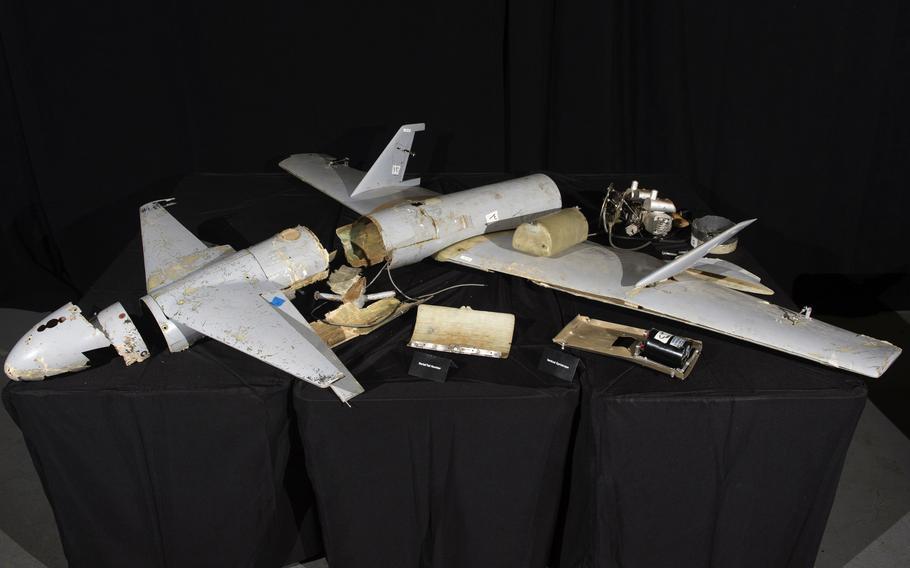
Components from an Iranian drone on display at Joint Base Anacostia-Bolling in Washington in 2018. Companies and seven people based in Iran, China, Russia and Turkey were added to a U.S. blacklist this week over accusations that they aided in the development of Tehrans aerial drone program. (EJ Hersom/Defense Department)
Four companies and seven people based in Iran, China, Russia, and Turkey were added to a U.S. blacklist this week over accusations that they aided in the development of Tehran’s aerial drone program.
A multinational network used aliases to hide shipments and financial transactions supporting the production and sale of drones such as Iran’s Shahed models, a Treasury Department statement Tuesday said.
The Shahed-136 is a loitering munition drone that U.S. and Ukrainian officials say is being provided to Russia for attacks on Ukrainian cities.
“Iran’s continued, deliberate proliferation of its (unmanned aerial vehicles) enables Russia, its proxies in the Middle East, and other destabilizing actors to undermine global stability,” Treasury Undersecretary Brian Nelson said in the statement.
This week’s sanctions blacklisted Iran-based Shahin Co., which the Treasury Department says is an alias of Iran Aircraft Manufacturing Industrial Co., an already sanctioned drone manufacturer.
Also included in the sanctions are three men associated with that company: Mehdi Gogerdchian, Hamidreza Noori and Husayn A’ini.
A company based in China, Shenzhen Jiasibo Technology, as well as two men, Su Chunpeng and Dong Wenbo, were also sanctioned.
The U.S. accused them of helping provide aerospace-grade radar altimeter systems, GPS and VHF antennas, sensors and other hardware to Iran.
Delta-Aero, Aerosila and Star, companies based in Russia, were sanctioned based on claims that they provided aircraft tires and helped with testing.
Two men based in Turkey, Mehmet Tokdemir and Alaaddin Aykut, were blacklisted for helping to exchange money to facilitate deals and bypass sanctions.
The sanctions announcement came a day after Iranian President Ebrahim Raisi spoke at the U.N. General Assembly in New York and denied that his country had sent drones to Russia for the Kremlin’s war against Ukraine.
Raisi demanded that the U.S. provide proof that Iran gave weapons or drones to the Russians after the February 2022 invasion of Ukraine.
U.S. officials say that Russia and Iran have deepened ties since the invasion and that Chinese manufacturers have increased sales of nonlethal aid to Moscow.
In August, the Defense Intelligence Agency released a report that compared photos of aerial drones recovered from Ukraine and Iraq and concluded that they matched known Iranian models.
Tuesday’s sanctions are an extension of sanctions in March, the Treasury Department said.